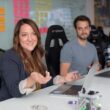19 year-old Stanford Ph.D. dropout Andrew Hsu is Changing Education
I got really excited when I first read about the Thiel 20 Under 20. I had some hesitation about speaking to some of the Fellows for Startups Open Sourced because I tend to look for founders who have at least experienced their trough of sorrow, but Andrew Hsu really jumped off the list of Fellows when I looked it over. He hasn’t experienced a trough of sorrow yet, but he has an interesting perspective on education and his startup is aimed at improving the model of learning for kids.
Warning: personal rant on education here; skip ahead a few paragraphs if you’re interested in getting to the interview. These are my personal opinions (not Andrew Hsu’s) in the next few paragraphs from my own experience. The Andrew Hsu interview is below in the Q&A format. I’ve always been interested in education because I’ve always had this sneaking suspicion that it was horribly broken. I’ve always struggled communicating what exactly is wrong with public education aside from personal rants, but after talking to Andrew, everything he says about education reflects how I’ve thought about it.
When I was 10 years old, I would constantly complain to my parents that I felt unchallenged and everything moved slowly. I had straight A’s, but I felt like I wasn’t learning anything useful. It was boring memorizing all of the states in America and where they went on a map. Really, if I want to know I’ll just pull up a map like normal people do, what’s the point in memorizing them? It’s the same argument where CS professors ask their students to memorize the runtime of various algorithms. In real life, people are going to look it up on Wikipedia; the actual importance is designing and understanding how the algorithms work, not quoting verbatim the runtimes of 25 different algorithms in a 50 minute span of time on a written test. If you’re a doctor, you might need to memorize lethal doses in an emergency room so you don’t give a patient too much morphine; it might matter in that case. I found out about Montessori schools after I started reading In the Plex–both Larry and Sergey attended Montessori schools–and that looked like an attractive model.
I’ve been a fan of how Khan Academy works (watch my interview with John Resig where he discusses this). I think the current model of public education resembles an assembly line too much. Everyone goes in at a certain age, they come out at a certain age. They all progress at the same pace and learn the exact same material. They also have no say in what they’re learning, they just take whatever is handed to them in the textbooks and that’s what they learn. Students sit in classrooms for 6 or 7 hours a day, which was never a good way to learn. You have a teacher who talks at an entire class, and when one student has a question, it blocks the whole class from moving forward. On the other hand, you also see the classes where nobody asks questions and some students just fall behind; there’s an implicit pressure to be quiet because you might risk looking stupid if you raise your hand. That might go away if students helping each other was baked in, which is part of both Khan Academy and now Airy Labs’ educational models. It feels more natural. Any time I ever got help from other students it was far more helpful than how the teacher was trying to present it.
And then there’s the issue of popularity, which some say is healthy because it teaches you important social skills. That might be true, but what ends up happening is people become so distracted with managing popularity that they lose the focus on the actual purpose of being in school: the education. Anyone who has read Why Nerds are Unpopular recognizes that smart people are penalized for their intelligence, and that’s something I got distracted with in school. I think I hold a little resentment to this day for how schools have degraded into a popularity contest rather than a place where we teach the next generation to build the next wave of innovative technologies. I’m not saying I didn’t drink and go to parties in college, but the problem feels much worse in high school than in college. In college, there’s far less social pressure to maintain popularity, and you’re actually valued for your intelligence.
The major difference to me in high school vs. college is the work in college–for me at least–is actually challenging and intellectually interesting. There were times when I got frustrated with how the specs were written, but otherwise you were given an assignment and there was a part of your mind that worried “will I be able to do this? Will I make the deadline for the first submission?” This is a healthy assignment because it pushes your limits. You have no idea how you’ll write this C++ image processing library that creates a collage of images based on a single input image. You’re taught the algorithms and data structures, and then you go off and figure out the rest with your partner.
End of rant–skip to here if you want the interview. There are lots of things broken with the model of public education and I think we’re in a period of time where that is changing. Andrew Hsu is one of the people who wants to change education by making it fun and introducing newer forms of media to teach.
Andrew has done a few impressive things, which makes me particularly interested in his outlook on education:
- Labeled as a “genius” from IQ testing at 6 years old
- Completed high school at 9 years old
- Passed ACT with a 99% score at 11 years old
- 3 B.S. degrees at 16 years old in neurobiology, biochemistry, and chemistry (with a minor in math)
- Started Stanford Ph.D. at 16 years old, dropped out at 19
- Accepted into the Peter Thiel 20 Under 20 Fellowship at 19 years old to create Airy Labs
Q: School is a very interesting topic to me; it’s something I talk about with all founders interviewed for Startups Open Sourced. How did you progress from K through 12?
Sure. So I’m originally from Seattle, where I went to public elementary school up until 4th grade and I was 7 years old at that point. I skipped a few grades by then and I was in some more advanced math classes, as well as the gifted program. The story there is: in 4th grade, my parents and teachers discovered I was so far ahead that I was making trouble and getting distracted. My parents finally made the incredibly wise decision to homeschool me. My homeschooling experience was done right because first off, we had my private teachers who my parents hired, my parents also taught me, and I also learned by myself. I did online virtual school type of curricula. Washington State has a very high concentration of homeschooling families, so we attended a co-op in this mega church called Legacy School.
A lot of the teachers also happened to be parents, and some of them were college professors. The classes were segregated by ability rather than by age, which is great. All of my classmates were much older than me, but I was at the right intellectual level. I was homeschooled from ages 7 to 11. When I was 10, I decided I wanted to become a biologist and run my own lab. I convinced a professor at the University of Washington to let me work in his microbiology lab for a year. While I was in that lab, I entered a project into the Washington State Science & Engineering Fair, and I won the grand prize there. I eventually went to the Intel International Science & Engineering Fair—this is when the SARS scare was happening, so China and Taiwan didn’t show up.
Eventually, I applied to the University of Washington and a lot of other colleges, but the others insisted that freshman live in dorms the first year and my mother said “no” to that. From 12 to 16 years-old (2003-2007), I got three degrees: neurobiology, biochemistry, and chemistry, and I also minored in math. After that in 2007, I knew I wanted to start a business but I didn’t know what the timing was. So I ended up going to Stanford and studied neurobiology. I didn’t go to M.I.T. because—and I am trying to choose my words carefully because I don’t want to offend anyone—I felt like people were a little bit more friendly at Stanford and it’s in Silicon Valley. I didn’t want to deal with the Boston weather. When I interviewed at M.I.T. I was wearing a winter coat, and it was still extremely cold there.
At Stanford, I was doing my neuroscience Ph.D. and I just left in January of 2011 to incorporate my company, which happened in April. We just raised some seed funding, so that’s the quick overview. The reason I dropped out was because I felt I had enough education as it was; I knew the timing was right to do a startup. I was happy to get out of there after 3 years because the time it takes to complete a Ph.D. is about 6.5 years. Whatever I did, I knew I wanted to be sure it had a major impact on the world. I wanted to build products that people would immediately use.
Q: To me, the most impressive thing is how quickly you completed school. You were done with high school at 11. What’s your secret? Was it the homeschooling?
A lot of people ask me this. When I started college, I was really young so I received a lot of media attention. I received an offer from a publisher in China to write a memoir autobiography when I was 12, which won the national children’s book award and they all ask this same question. To be honest, I don’t have a complete answer. I think genetics play a small role. I’m naturally smart and I have the ability to absorb information pretty quickly just by reading. But that only counts for a small part. I’ve read a lot of self-help books, but there are a lot of rigorous and diligent systems that I make sure I follow in order to get things done.
At the end of every day, you measure yourself by your productivity and how much you get done. There are systems to ensure I stay productive.
Q: Do you have any particular daily habits that you use or do you have a favorite book?
I’m trying to setup systems right now to maximize productivity, and the major part of that is goal setting. Most people just don’t know how to do proper goal setting. It’s important to plan for the next day what you want to get done.
What is proper goal setting? Most people when they set goals, if they want to learn a scripting language like Lua, they’ll say “I want to learn Lua today.” But proper goal setting is about using numbers, quantities, and times. Be as specific as you can, and set very specific goals for every single day. What are you trying to accomplish by the end of the day? Do it the night before. At the end of the day, it’s okay if you don’t accomplish all of your goals—that might even be good; it means you might be setting a high bar for yourself.
At the end of every day, review your productivity for the day. Then you set your goals for the next day. That’s the cycle and the ritual I’ve built up over time. I think it’s psychologically very effective because it gives you a specific set of things to do and it sets up a structure for doing them. There are a lot of myths people believe about planning about how it stifles creativity and innovation: they think it creates too much rigor, so you can’t be imaginative. That’s a false dichotomy.
So every day, do you basically wake up and say “last night I told myself I have to do these three things” and then you figure out at the end of the day what works?
Yeah, the core of setting goals and getting those goals done works for me, and I’ve told people about it and it works for them. I’m trying to use the same strategy in the company because it’s a tremendous tactic to be successful.
Q: How do you deal with distractions though? I think a lot of people set goals and they want to be productive, but then distractions get in the way: you have TV, Starcraft, games, all of that stuff.
I’m running a game company. I love games—I played so many games in college it was ridiculous. I could have had much better grades if I didn’t play games. My time is very limited now, so I play them every once in a while. I don’t own a TV, but I watch stuff on Hulu occasionally.
But when you set specific goals, you just know what you need to do. It affects your psychology. You’re less prone to be distracted. I’m pretty athletic, so I enjoy all types of things—sports, computer games, hanging out with friends. I don’t have a magical way of dealing with all of it, but I just set goals for myself and I try very hard to strive to complete those goals. The goals I set for myself are slightly unrealistic because it helps me push the envelope and be more productive.
For distractions, I just try to deal with them as they come. For e-mails, I try to respond to them immediately. I read an article by the person who started Slideshare, and she always replies to e-mails on the spot because if you don’t, you are taking up more mental capacity to read once and then again later.
Q: Do you think the public school system is broken in any way? You were homeschooled; do you think there’s anything that public schools can learn from that model?
I have very strong views on the education system. I’ve done non-profit stuff my whole life, but one I’m currently setting up is to create a series of public charter schools around the world starting in northern or southern California. They’d use the mechanics of games, technology, and neuroscience to transform the curriculum. More people are talking about “how do we revamp the industrial age educational model” and what I saw at the Legacy School co-op was an important split according to skill, not age. The caveat is there needs to be proper socialization. This wasn’t a problem for me because I was athletic from a young age, so that worked to my advantage, but a lot of parents aren’t cognizant of this. Parents want to homeschool their kids for the wrong reasons, like they don’t want their kids to learn about evolution; that’s terrible.
Here’s where I see an ideal school heading, hopefully in the next 5 years or so. The actual physical size of the school will shrink. The types of spaces present will become areas where kids need to socialize—for example the gym. There’s going to be a blend of physical schooling and online virtual schools. This will help democratize education because kids will be able to get the best education from the best teachers around the world. This is similar to what Mega Study is doing in Korea. The teacher’s role transforms from a one-way faucet of information into a manager and curator education. At some point, they’ll use newer technology—think iPads—to track analytics. The parents will also have access to the analytics to see how the kids progress. There are companies working on this right now, but this is where it’s headed. I think technological tracking of educational analytics and advancement plus the use of powerful gaming mechanics to make it engaging is what I see the ideal future of the school becoming.
Q: Do you think the Khan Academy is the right model?
I think the videos are a little bit archaic. I think there will be an evolution into a much richer multimedia experience. Beyond video, there will be games and interactive experiences.
Q: Is this the gap you’re filling in with your startup?
Yes. My mission is to change the world by changing education. I love games and I think it’s how education will be transformed.
Q: I recently read an article about studying how people might focus on memorization, while others will link it to existing knowledge. What approach did you take?
This gets interesting because there’s some application to neuroscience here. There’s a principle called the “binding principle” which states if you’re trying to learn new information, your brain retains it if you have a previous cognitive schema or memory to bind the new information to. Let’s use kids an example: let’s say you’re about to teach your kids a new lesson, have them create an advanced organizer. This organizer is a diagram or set of diagrams of what the student already knows about this topic. As you teach them the new information, they can think about it in the context of what they already know and they can make mental links to their existing knowledge. It increases learning effectiveness significantly.
Q: What’s the name of your startup and what are you building?
The startup is called Airy Labs and we make social learning games for young children. The idea is that educational games mostly suck and we want to make them fun. I see games as these enormous opportunities for learning because games are simply abstract rules based on new systems. We want to make massively popular games that tens of millions of kids will play and the parents will actually support it. We’re trying to align the parents’ and children’s interests.
Most games we’re setting up now are learning agnostic. I think we can teach anything with games, and we’ll start off with math, English, biology, and memory training. Some parents have e-mailed asking about anti-bullying conflict resolution type of games. A leader from a youth golf organization e-mailed and there’s a lot of etiquette that we can teach there, for example.
We want to be the Zynga of games, but on the long-term act more like Disney where we have a strong brand that parents trust and kids love using. I want to build a larger scale business around making learning fun.
Q: How many games are working on now? What language are you using to build this? How will the games look and feel?
We’re in the prototyping stage right now. We’ll aim to release something within 6 months. Those decisions are still up in the air, but right now we’re starting with Corona SDK (Lua). This was a fairly impulsive decision, so it might change.
Mostly, we’re trying to encourage social pressure to play and learn. That’s the social part that is exciting. We’ll have 2d or 3d vector graphics as part of it, we want to have a high bar visually.
Q: You said it was scary to drop out, since you have dropped out have there been any low points?
The fundraising was stressful up until the end because I was doing it alone. It eventually got finished, but there’s enormous trust placed in me because they invest in me. Now that it’s done, I have to deliver and not screw things up. That’s my next goal: not screwing things up! I have to pay back that trust.
There were people who turned me down, and my personal opinion is I don’t think it’s a smart decision. You just ignore that and move on.
Q: What’s your biggest challenge right now?
The single most challenging thing is hiring good designers. I have an opinion that great designers are very rare. There are lots of mediocre designers, but finding the top designers is difficult.
If you enjoyed reading excerpts from this interview, you’ll enjoy reading Startups Open Sourced.




